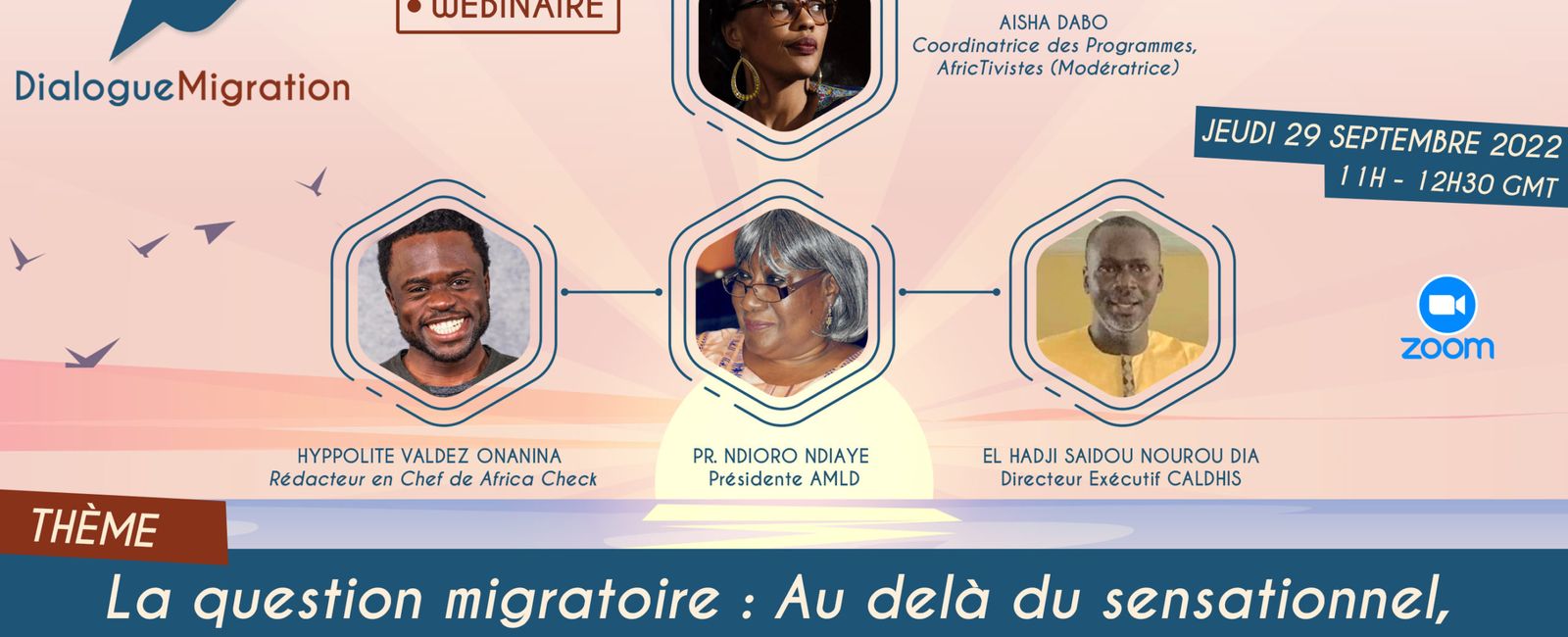

AfricTivistes launched the Migration Dialogue news platform on 29 September 2022 by organising a webinar under the theme: “The migration issue: looking beyond sensationalism, politicisation and prejudice!” during which the panellists pointed out a series of recommendations in order to have a more ethical narrative around this topic.
Migration is a very human phenomenon. However, the often sensational coverage of this natural fact ends up dehumanising migrants. We talk about them as “vulgar packages” that we don’t know what to do with. Migrants find themselves at the centre of political and social divisions and stakes with the rise of xenophobia and populism, of which they always fall victims. As a result, AfricTivistes organised a webinar to launch its latest news platform in an effort to dispassionate the debate on migration.
The webinar included Professor Ndioro Ndiaye, President of the Alliance for Migration Leadership and Development (AMLD), former Deputy Director General of the International Organization for Migration (IOM); Mr. El Hadji Seydou Nourou DIA, Communication Expert, Executive Director of the African Centre for Leadership, Human Rights and Social Innovation (CALDHIS); and Mr. Hyppolite Valdez Onanina, Journalist and Editor-in-Chief of AfricaCheck
“Many African countries do not have a national migration policy,” Professor Ndioro Ndiaye reveals
During her intervention, Professor Ndioro Ndiaye first recalled the importance of a migration policy in political governance in Africa. According to her, many African countries do not have a national migration policy. “It is important for any country, whether it is a country of the North or the South (of origin or destination), to have a national migration policy document that is coordinated, coherent and shared with all stakeholders, not only the government but also civil society organisations,” she explained.
She further argued that developing countries lack a comprehensive policy that takes into account all the concerns of all the ministries (Interior, Foreign Affairs, Economy, Finance and Planning, Women and Justice) that are involved in the governance of migration. “We have not managed to have a cohesion at the level of all these ministries to create and have the Presidency of the Republic accept the idea of a coordination that should be lodged in the Prime Minister’s Office. Because we need a supra-governmental structure”, says the President of the AMLD. She lamented the fact that there is both a lack of coordination to approve together a real policy document and a lack of institutional anchorage.
The former Deputy Director General of the International Organisation for Migration in Geneva from 1999 to 2009 also believes that there is a need for greater visibility and that the African media should take the coverage of the migration issue seriously by trying to understand the phenomenon and inform citizens. She also recommended that awareness raising actions target people at risk of migrating and who do not understand what is at stake when they leave. She also suggested the establishment of a platform, coordinated by an organisation such as AfricTivistes, to map the organisations working in migration information in order to develop a real and pan-African programme. “It is also necessary to talk about and document what is happening in transit countries such as Libya and Morocco,” she concluded.
“We need to change the editorial approach to the migration issue,” El Hadji Seydou Nourou Dia says
Taking the floor, Mr. El Hadji Seydou Nourou Dia, Executive Director of the African Centre for Leadership, Human Rights and Social Innovation (CALDHIS), first stated that the overall handling of the migration issue is not very satisfactory. According to him, this is due to the lack of reliable data. He also deplored the fact that the issue is too often confined to the back page of the news “In addition to the lack of regular monitoring of the issue, there often have to be disasters for the issue to draw media attention,” he deplored.
He went on to stress that the basic principle of journalism is to verify the facts, regardless of the scope and relevance of the subject. But nowadays, he lamented, false information circulates at a rapid rate, and the scramble for information means that we do not have much discretion. But when the journalist’s duty is to “inform fairly and truthfully”, he added, one can only give the right information.
Similarly, El Hadji Seydou Nourou Dia called for capacity building for journalists so that they master the topic, the terms and expressions used. Still, according to Mr. Dia, we must think about how to generate interest. “The organisations working on these issues should encourage journalists to take an interest by initiating actions that attract journalists to the topic, such as reporting competitions, etc. This will help push journalists to participate in the debate. This will help encourage journalists to investigate and go beyond simple reporting and produce analytical papers or in-depth productions to raise awareness among governments and others interested in the subject.
Mr Dia also advocates for a change in editorial approaches by making sure that people really understand the issues of migration. “People need to understand that you don’t migrate without a migration project and that you can’t go elsewhere for what you can find at home,” he says. He also believes that mastering and analysing the migration data will lead to insights that could be useful for everyone. He also advocates for the capacity building of journalists in fact-checking.
The Executive Director of the African Centre for Leadership, Human Rights and Social Innovation (CALDHIS) says he is convinced that to reverse the trend, we need to come back to our values and redefine our concept of success. “We are in a society where image is everything. We must ensure that young people do not have to assimilate these social pressures and understand that they can succeed at home. When you earn 30,000 CFA francs a day, there is no reason to try anything new. And the media must participate in this paradigm shift,” he explained.
“Lack and low quality of data hampers migration fact-checking,” Valdez Onanina points out
The webinar also discussed the journalists’ attitude towards the increasing number of fake news stories. In his presentation, Valdez Onanina, editor-in-chief of Africa Check, first argued that from experience, several issues related to the economy, employment, … are always related to the migration issue. He argues: “In fact-checking on migration, we are confronted with a lack and low quality of data. It is a subject that interests the public but unfortunately is subjected to a lot of manipulation with a lot of false information because there is no migration policy with clear data to back it. This can lead to a lot of false information”, explained the editor of Africa Check.
That said, he pointed out that the media and journalists’ stance on this issue must be factual. “We need to handle the subject of migration with facts and correct data that allow for a better understanding of the phenomenon and avoid sensationalising it. Otherwise, this very important issue will not make the headlines. And this situation must be remedied. We have the impression that migration is only mentioned in the media when there is a tragedy”, he said.
However, Valdez Onanina believes that changing the narrative around migration is not only the responsibility of the media and journalists, but also of the stakeholders. “Collaboration between journalists and stakeholders should not be random and ad hoc. But we must try to set up permanent partnerships so that the issue is covered on a permanent basis. We must not leave the narrative on migration to social media. If we do, we expose ourselves to manipulation and if there is misinformation, it is impossible to deal with the phenomenon in an appropriate way so as to be able to provide appropriate responses,” concluded Mr Onanina.






